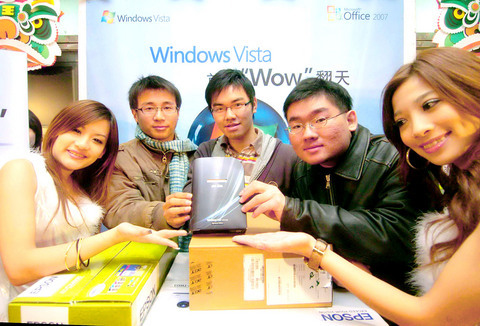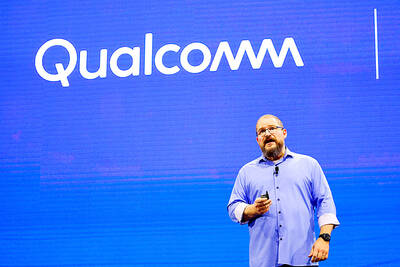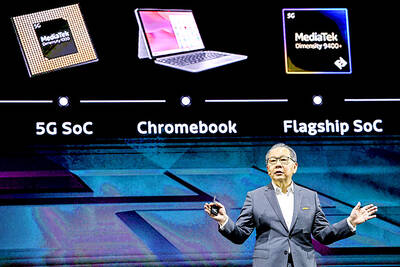Despite the media hype and heavy promotional campaign, Microsoft's Vista operating system (OS) received a lukewarm response at its debut in Taipei yesterday.
Various incentives, such as free photo printers, projectors, or USB drivers, were offered to the first 200 buyers of Vista, but fewer than 70 buyers showed up at 6:30pm, 30 minutes after the official launch.
"The crowd is much smaller compared with the launch of Windows XP five years ago," said Jason Chang (

PHOTO: LIAO YAO TUNG, TAIPEI TIMES
He arrived about an hour before the launch, and his queue number was only 34.
The 40-year-old had tested the beta version of Vista and found some software compatibility glitches, but was still keen to get the latest copy to take advantage of the freebies.
But for Hsieh Hao-cheng (
"Consumers will be enthralled by the new Aero feature," said the 24-year-old engineer, referring to visual effects such as the glass-like interface elements.
He received a limited edition Vista box signed by Microsoft founder Bill Gates, an Epson photo printer, as well as a portable computer running on Intel Centrino Duo processor worth NT$40,000 (US$1,200).
The consumer release of Vista, along with the 2007 Microsoft Office System, was held yesterday in front of Nova, one of Taipei's major IT shops located near the bustling Taipei Railway Station.
Despite the lower-than-expected turnout, Microsoft Taiwan remained upbeat on Vista's impact, which it predicted would be as big as that of Windows 95. Introduced in 1995, Windows 95 marked a milestone in the history of operating systems with its switch from 16-bit disk operating system architecture to 32 bits and introduction of graphics user interface.
"Taiwanese consumers were some of the first in the world to get Vista," Davis Tsai (
Local buyers even beat their US counterparts in getting their hands on fresh Vista boxes given the time difference.
Tsai said the sales of Vista were expected to outpace its predecessors, as it boasts better features such as enhanced security to improve productivity.
Christine Chen (
"General consumers are always the early adopters, and more people will buy the OS after the Lunar New Year and back-to-school period in summer," she said.
Microsoft Taiwan has pumped in lots of marketing dollars to ensure the success of Vista's launch.
In addition to setting up demo stations nationwide, it will hold a "Windows Vista Wow" concert on Sunday, with Mandarin pop stars Jolin Tsai (
The advent of Vista signals the shift to 64-bit architecture from 32 bits, but it came more than five years after the release of Windows XP, making it the longest time span between major Windows releases.

Intel Corp yesterday reinforced its determination to strengthen its partnerships with Taiwan’s ecosystem partners including original-electronic-manufacturing (OEM) companies such as Hon Hai Precision Industry Co (鴻海精密) and chipmaker United Microelectronics Corp (UMC, 聯電). “Tonight marks a new beginning. We renew our new partnership with Taiwan ecosystem,” Intel new chief executive officer Tan Lip-bu (陳立武) said at a dinner with representatives from the company’s local partners, celebrating the 40th anniversary of the US chip giant’s presence in Taiwan. Tan took the reins at Intel six weeks ago aiming to reform the chipmaker and revive its past glory. This is the first time Tan

Qualcomm Inc is strengthening its partnerships with Taiwan Semiconductor Manufacturing Co (TSMC, 台積電) and original design manufacturers (ODMs) in Taiwan as it expands its presence in the artificial intelligence (AI) computer market, CEO Cristiano Amon said in Taipei yesterday ahead of the annual Computex trade show. “Historically we’ve always been a very big customer of TSMC, and we continue to be,” Amon said during a media Q&A session. “For chip manufacturing, we’re among the largest fabless [semiconductor designers],” he said, noting that Qualcomm, a leading provider of mobile and AI-enabled chipsets, ships about 40 billion components every year, with TSMC being

‘FAILED EXPORT CONTROLS’: Jensen Huang said that Washington should maximize the speed of AI diffusion, because not doing so would give competitors an advantage Nvidia Corp cofounder and chief executive officer Jensen Huang (黃仁勳) yesterday criticized the US government’s restrictions on exports of artificial intelligence (AI) chips to China, saying that the policy was a failure and would only spur China to accelerate AI development. The export controls gave China the spirit, motivation and government support to accelerate AI development, Huang told reporters at the Computex trade show in Taipei. The competition in China is already intense, given its strong software capabilities, extensive technology ecosystems and work efficiency, he said. “All in all, the export controls were a failure. The facts would suggest it,” he said. “The US

NEW PRODUCTS: MediaTek has been diversifying its product lines to minimize operational risks as mobile chips remain the company’s biggest revenue source MediaTek Inc (聯發科), the world’s biggest supplier of smartphone chips, yesterday said the tape-out process for its first 2-nanometer chip would take place in September, paving the way for volume production of its most advanced chip, likely to be its next-generation flagship smartphone chip, around the year-end at the earliest. MediaTek has been leveraging advanced process technologies from its foundry partner, Taiwan Semiconductor Manufacturing Co (TSMC, 台積電), to build its flagship mobile phone chips, a segment it once relinquished and then recovered four years ago as it released its Dimensity series. In the semiconductor industry, a tape-out refers to the